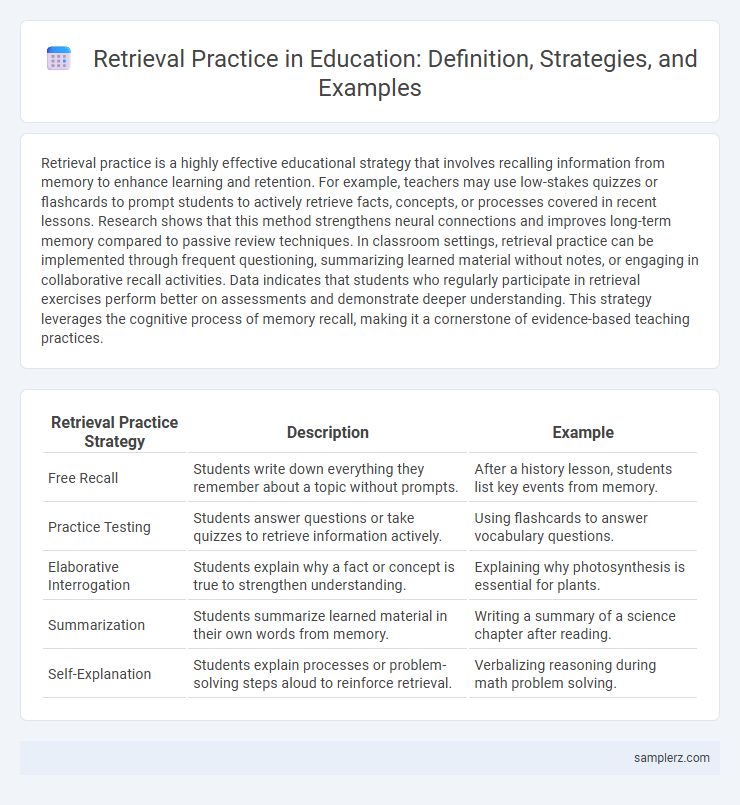Retrieval practice is a highly effective educational strategy that involves recalling information from memory to enhance learning and retention. For example, teachers may use low-stakes quizzes or flashcards to prompt students to actively retrieve facts, concepts, or processes covered in recent lessons. Research shows that this method strengthens neural connections and improves long-term memory compared to passive review techniques. In classroom settings, retrieval practice can be implemented through frequent questioning, summarizing learned material without notes, or engaging in collaborative recall activities. Data indicates that students who regularly participate in retrieval exercises perform better on assessments and demonstrate deeper understanding. This strategy leverages the cognitive process of memory recall, making it a cornerstone of evidence-based teaching practices.
Table of Comparison
| Retrieval Practice Strategy | Description | Example |
|---|---|---|
| Free Recall | Students write down everything they remember about a topic without prompts. | After a history lesson, students list key events from memory. |
| Practice Testing | Students answer questions or take quizzes to retrieve information actively. | Using flashcards to answer vocabulary questions. |
| Elaborative Interrogation | Students explain why a fact or concept is true to strengthen understanding. | Explaining why photosynthesis is essential for plants. |
| Summarization | Students summarize learned material in their own words from memory. | Writing a summary of a science chapter after reading. |
| Self-Explanation | Students explain processes or problem-solving steps aloud to reinforce retrieval. | Verbalizing reasoning during math problem solving. |
Effective Retrieval Practice Strategies in Education
Effective retrieval practice strategies in education include using low-stakes quizzes, flashcards, and spaced repetition to reinforce knowledge retention. Teachers implement frequent, varied recall activities that encourage students to actively retrieve information from memory, improving long-term learning outcomes. Research shows that incorporating retrieval practice enhances metacognition and helps identify knowledge gaps for targeted instruction.
Classroom Examples of Retrieval Practice Techniques
Classroom examples of retrieval practice techniques include using low-stakes quizzes, flashcards, and think-pair-share activities to actively recall information. Teachers frequently implement retrieval exercises such as exit tickets and quick write prompts to reinforce learning and enhance memory retention. Incorporating spaced retrieval and self-testing methods helps students consolidate knowledge and improve long-term recall in various educational settings.
Implementing Retrieval Practice with Spaced Repetition
Implementing retrieval practice with spaced repetition involves students actively recalling information at increasing intervals to enhance long-term memory retention. Tools like flashcards and apps such as Anki facilitate this strategy by scheduling reviews based on individual performance metrics. Research from cognitive psychology highlights that this combined approach significantly improves retention and minimizes forgetting compared to massed practice.
Low-Stakes Quizzing as a Retrieval Practice Tool
Low-stakes quizzing serves as an effective retrieval practice tool by encouraging frequent recall without the pressure of high consequences, enhancing long-term memory retention. This strategy helps students reinforce learning through repeated retrieval, which strengthens neural connections and improves information recall. Research shows that incorporating low-stakes quizzes into regular study sessions increases student engagement and academic performance.
Retrieval Practice through Concept Mapping
Retrieval practice through concept mapping enhances learning by encouraging students to actively recall and organize information, strengthening memory connections. This strategy involves creating visual diagrams that link key concepts, promoting deeper understanding and long-term retention. Research shows that concept mapping improves critical thinking and helps learners integrate new knowledge more effectively.
Using Flashcards for Enhanced Retrieval Practice
Using flashcards effectively boosts retrieval practice by prompting active recall of key concepts, which strengthens memory retention and reinforces learning pathways. Research shows spaced repetition with flashcards optimizes long-term retention by gradually increasing intervals between review sessions. Digital flashcard tools incorporating personalized algorithms further enhance retrieval practice by adapting to individual learner progress and targeting weaker areas.
Peer Teaching as a Retrieval Practice Strategy
Peer teaching as a retrieval practice strategy involves students explaining concepts to their classmates, which strengthens memory retention and deepens understanding. Research shows that actively retrieving information during peer discussions enhances long-term recall and reinforces learning pathways in the brain. Incorporating peer teaching sessions in the curriculum can significantly improve student performance and engagement.
Incorporating Retrieval Practice in Homework Assignments
Incorporating retrieval practice in homework assignments enhances long-term retention by prompting students to recall information independently, such as through low-stakes quizzes or flashcard reviews. Studies from cognitive psychology highlight that repeated retrieval strengthens memory pathways, making concepts more accessible during exams. Implementing this strategy in educational settings leads to improved academic performance and deeper understanding across subject areas.
Retrieval Practice via Think-Pair-Share Activities
Retrieval practice through Think-Pair-Share activities enhances memory retention by prompting students to recall information independently, discuss it with a partner, and then share with the group. This strategy leverages active retrieval and social interaction, reinforcing learning and promoting deeper understanding. Research indicates that using Think-Pair-Share can improve student performance on assessments by engaging retrieval pathways effectively.
Digital Tools Supporting Retrieval Practice in Learning
Digital tools such as Quizlet, Kahoot!, and Anki effectively support retrieval practice by providing interactive flashcards, quizzes, and spaced repetition algorithms that enhance memory reinforcement. These platforms enable learners to engage in repeated self-testing, which strengthens neural connections and promotes long-term retention. Integrating such digital retrieval practice tools into educational strategies improves student performance and deepens conceptual understanding.

example of retrieval practice in strategy Infographic
 samplerz.com
samplerz.com